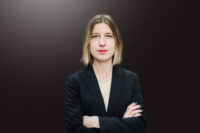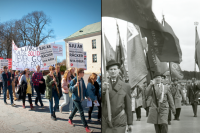THE NEW RACISM
Northern European countries have become a ”populist laboratory” with nationalist groups exploiting fear and hiding behind liberal values to deliver a modern version of old hatred. In the progressive European magazine ”Fresh Thinking” Per Wirtén argues that the left has fallen into a trap set by rightwing political groups.
I had just left Graceland in Memphis, Tennessee, when I heard about the massacre of young social democrats in Norway. An American I met said a few nice words, but I noticed how his worldview was challenged when I told him that the terrorist was white. Terrorists, aren’t they supposed to be Muslims?
The US media had no illusions. Reporters and columnists analysed how the fear of both Islam and multiculturalism have been incorporated into European politics. They underlined the collaboration, a mutual understanding, between Islamophobic opinions and the political elites in the Netherlands and Denmark. You could predict the shape of a developing European consensus. The dark image of Europe that the US media portrayed might not have embraced all the complexities of the issue, but it was unblinkered and correct about how the new attitude fitted into a wider context. Anders Behring Breivik, the Norwegian terrorist, summarised his enemies as Muslims, multiculturalists and “cultural Marxists” – and that was no surprise. Hadn’t we heard that before, but in a more enlightened context?
When history is written, you look for the turning points. 2010 might have been one. In the Netherlands, the governing centre-right parties enacted an agreement of cooperation with Geert Wilder’s Islamophobic Freedom Party. During the last days of summer, Roma people were hunted down by police and deported from France, Sweden and other countries – despite having European citizenship. In Hungary, the newly elected government prepared restrictions on the freedom of press, while writing a new constitutional law based on religious and national mythology. “Austerity” became the only answer for the Euro crisis. Adding the small incidents together, an image emerged of a continent drifting towards an old abyss.
I visited Amsterdam over a few cold days in spring of 2010, directly before the election that was Geert Wilder’s breakthrough. I talked to left-leaning liberals, social democrats, socialists, and intellectuals. Monica Sie, chairman of a social democratic thinktank, hit the nail on the head when she described her country as a “populist laboratory”. The entire political establishment is being called into question, and on good grounds. It has refused to politicise questions such as immigration, integration, the EU and globalisation. The populist uproar has been channelled through these very questions. PvdA, the social democratic party, is 100 percent loyal to the system and very technocratic. Populism, Monica Sie observed, then becomes a deadly threat to the very identity of the party.
back in Stockholm I began to ponder the silence I had met in Amsterdam. Why had my Dutch colleagues removed the word multicultural from their vocabulary? Why had they stopped talking about struc- tural racism? Why had they avoided ques- tions about discrimination? In recent times, these concepts have been the starting point for all radical discussions on the sub- ject. To me, they are still important tools when trying to understand Europe. Was the silence a sign indicating how quickly the public conversation can be limited?
The Netherlands is not just a populist laboratory. The country has also, together with Denmark, led a successful quest for a sort of racism tailor-made for the welfare states of northern Europe – and not just through populist politicians such as Pim Fortuyn (pictured right) and Geert Wilders (pictured above), but sometimes integrated in the state itself. It has become a model for others. What I met in Amsterdam is now flowing through many European cities.
The new racism in Northern Europe manages to leave its old limits behind. Instead, its representatives successfully portray themselves as defenders of the Enlightenment, secularism and the emancipation of mankind – the basic values of the left.
They describe the fundamental conflict as a battle between European freedom and Muslim intolerance brought by immigration. Consciously, the rights of individuals are put in sharp contrast. They kidnap the ideas of freedom, and incorporate racist and Islamophobic values.
This pattern has been repeated suc-cessfully in precisely the European welfare states that regard themselves as especially enlightened and modern: Denmark, Norway, Switzerland, and Austria. Jimmie Åkesson, party leader of the xenophobic Sweden Democrats, declared in 2010 that he understands “the significant worry felt by many homosexuals before the mass influx of immigrants and the hatred of homosexuality that increasing Islamisation brings with it.”
The following election became the breakthrough for the Sweden Democrats, winning seats in the Riksdag for the first time. During the election campaign, Åkesson visited gay clubs in Stockholm. When the newly elected Riksdag opened, he arrived wearing the national costume. It is a racism finding its way in a northern European laboratory experiment, and right now it has a strong political wind in its sails. There is no room for complacency at the setbacks that the Norwegian and Danish xenophobic parties suffered in this autumn’s elections. This movement works patiently, with the assumption of power – political as well as cultural – as its fixed goal.
In their laboratories, liberal rhetoric is mixed with unforgiving anti-liberalism. Many are tempted – not just the Danish and Dutch rightwing liberals who have chosen political cooperation. Even social democrats, feminists and leftwing intellectuals seem to have problems resisting the trap set by Geert Wilders. Not by cooperation, but by overtaking their way of presenting the problem. Perspectives are narrowed, concepts disappear and cultural explanations replace political ones. How many European social democrats still speak about institutional racism? Instead, an old desire has woken up among left- wing socialists: allowing class to exclude other perspectives of power relations, such as racism.
In other parts of Europe, there are similar attempts to make racism appealing for those who portray themselves as modern and enlightened. It is happening with varying degrees of success in Italy, France and Hungary. In a much-discussed speech conducted in the autumn of 2010, German Chancellor Angela Merkel disassociated herself from the attempt to create a “multicultural society where people live side by side and enjoy each other”, since it “has failed, utterly failed”.
France’s leader Nicolas Sarkozy and Britain’s David Cameron quickly followed in her footsteps. No social democratic opposition could be heard, instead it was a sigh of relief. The ideas surrounding the concept of multiculturalism have always created an anxiety – even within large parts of the left. Merkel simply expressed a common desire for what is ordinary and recognisable, a return to a lost cultural security in a time of difficult economic insecurity.
The disassociation from multiculturalism was a major victory for the xenophobic right. They have long tried to erase the very word from the debate, which is not surprising. Just by saying multiculturalism, a more independent conception of the world is set in motion: nationalism is questioned, immigration welcomed.
In countries such as Britain and Sweden, the concept has become a popular signal illustrating a popular will to live in open societies characterised by immigration. It has been confirmed by their own experiences of everyday life in a big city; of conflicts, negotiations and new perspectives, different languages, new music and a different way of speaking about the meaning of life. The concept was a political achievement. Many mistakes have been committed in the name of multiculturalism. A simplistic view of culture, religion and ethnicity has been mixed with old racism; language education for immigrants has been inadequate or non-existent; so-called honour killings have been neglected. The state and the public have not always taken responsibility. But if you leave behind the concept of multiculturalism as a social narrative, and racial discrimination as an important explanation of grave injustices – what are you left with?
These dislocations in the European public debate, which the US reporters quickly grasped after the massacre in Norway, are in turn wrapped into a bigger narrative about unsuccessful integration.
The situation for people with a different coloured skin, so-called immigrants, is serious: high unemployment, violence and hostile attitudes. In his enthusiastic book Europe’s Promise, American Steve Hill observes that the continent needs a civil rights movement.
But the question of integration has lately focused on the fear of small clusters of revolutionary Islamists instead. The critique of integration policy has merged with the critique of multiculturalism, transforming into a political question of security focusing on the “Muslim”. The volume is turned up. London, previously the model for European cities of immigration, has been transformed into a dangerous example of “multicultural appeasement”. It is as if Europe had ended up in a repetition of 1938.
There’s a hair’s breadth between the defence of the liberal values of freedom and anti-liberal legislation – even among some progressive social democrats. Karl Popper’s classic device about “intolerance against the intolerant” can be transformed, with a gentle push in the back, into the “no freedom for the enemies of freedom” of the French revolution. So where has it gone, the tolerance we were supposed to defend? The Dutch trap shuts. The kidnapping is complete. We are left with a question: How could conceptions about freedom be distorted to support discrimination and exclusion?
One practical way to avoid the carefully set trap is to come back to reality. Out there piles of research reports about discrimination in the workplace are waiting, together with experiences told by the low-paid working class (for many years now those who are non-white), and testimonies from the Roma people about violence and contempt. To let questions about freedom have their starting-point in the powerlessness of the excluded, isn’t that a social democratic mission?
And how deeply rooted in reality is the assertion that freedom primarily is threatened by Islamists, conservative Muslims, and multicultural-loving politicians of appeasement? When British Muslims were burning The Satanic Verses in 1989, the anger of intolerance was widespread among Europe’s Muslims. But when the Danish newspaper Jyllands-Posten published the Muhammad cartoons 16 years later, only small crowds were protesting with similar militant messages in Europe.
The violent reactions occurred on totally different continents. In Paris, the cartoons were published only a few months after the civil unrest in the suburbs. Everyone held their breath, but no Molotov cocktails were thrown. Most Muslims seemed to embrace the general view; the cartoons were offensive, but you have to endure such a thing in a democracy. A law against blasphemy would require the moulding of public opinion – not murder. That was one of the more hopeful European stories, lost in the new prevailing silence, that I reflected on after my journey to Amsterdam.
Geert Wilder’s and the Danish People’s Party’s Pia Kjærsgaard’s description of society has an advantage in the ongoing battle that is deciding how the reality should be portrayed. Even socialists and social democrats have moved in under their shade. Does that explain why the Norwegian terrorist’s creation of three enemies – Muslims, multiculturalists and ”cultural Marxists” – felt so unpleasantly familiar?
After all, we had already met versions of these enemies on enlightened editorial pages, in respected periodicals and reviews, and even at conferences for progressive social democrats.
Per Wirtén is a Swedish author and journalist. He has written extensively about migration, immigration, cosmopolitanism and multiculturalism.
För att erbjuda fördjupning och reflektion i samband med den nu pågående rättegången mot terroristen Anders Behring Breivik har Dagens Arena fått möjlighet att återpublicera texten ovan av Per Wirtén på svenska. Texten publicerades ursprungligen på engelska i det europeiska progressiva magasinet Fresh Thinking. Eftersom texten har efterfrågats även på engelska, och inte bara som pdf i ett magasin, publicerar vi texten även här.
Följ Dagens Arena på Facebook och Twitter, och prenumerera på vårt nyhetsbrev för att ta del av granskande journalistik, nyheter, opinion och fördjupning.

































